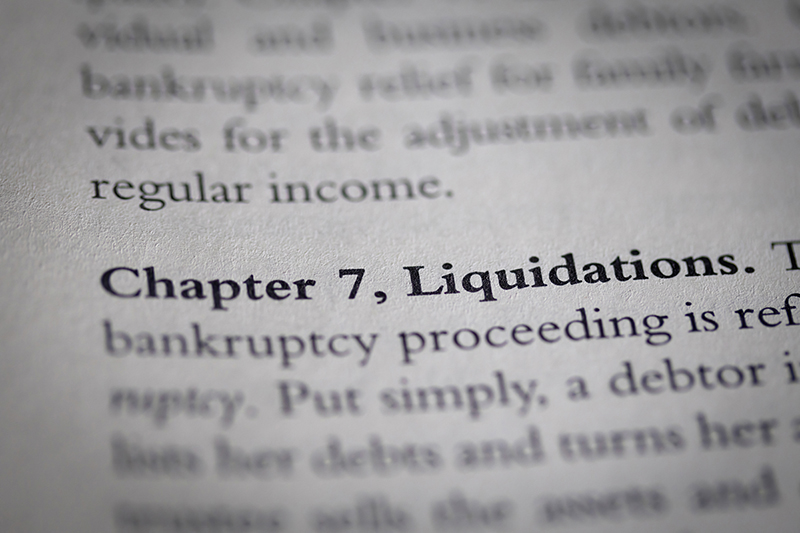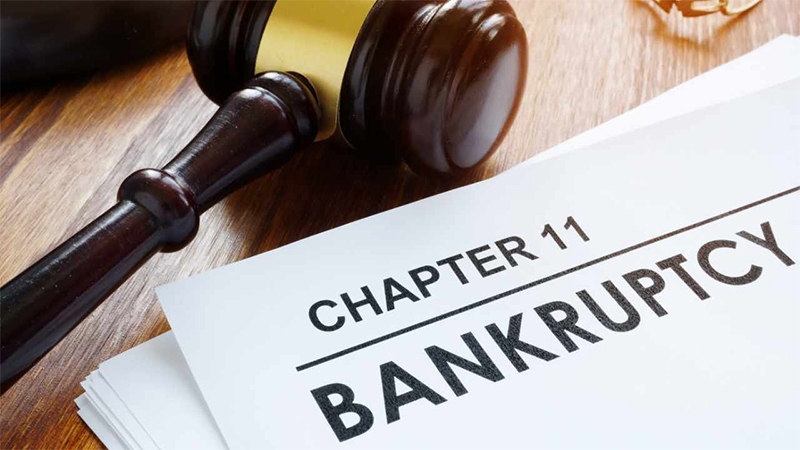When facing financial challenges, individuals and businesses often turn to bankruptcy as a legal remedy. Chapter 7 and Chapter 11 are two distinct chapters within the bankruptcy code, each serving different purposes and catering to specific financial situations.
Understanding the differences between Chapter 7 and Chapter 11 is important for individuals and businesses navigating the complexities of bankruptcy. Let’s look into the nuances of Chapter 7 and Chapter 11, and shed light on their unique features and how they apply to varying financial circumstances.
What is Chapter 7 Bankruptcy?
Chapter 7 filing increased by 5.61% year-over-year (2,479 in 2022 to 2,618 in 2023). [1]
Chapter 7 bankruptcy, also known as “liquidation bankruptcy,” is a legal process that allows individuals and businesses to eliminate most or all of their outstanding debts. When a person or business files for Chapter 7 bankruptcy, a trustee is appointed to oversee the process. The trustee’s main responsibility is to sell the debtor’s nonexempt assets and distribute the proceeds to the creditors.
Nonexempt assets may include things like second homes, valuable collections, and luxury items. Many personal and household items are typically exempt from liquidation, such as clothing, furniture, and necessary household items.
Once the nonexempt assets have been liquidated, the proceeds are used to pay off as much of the debtor’s outstanding debts as possible. Any remaining qualifying debts are then discharged, meaning the debtor is no longer legally obligated to repay them.
Certain types of debts, such as child support, alimony, student loans, and most taxes, are generally not eligible for discharge.

What is the Advantage of Chapter 7 Bankruptcy?
One of the primary advantages of filing for Chapter 7 bankruptcy is the potential for a fresh start. By wiping the slate clean of these types of debts, individuals or businesses can begin to rebuild their financial lives without the burden of overwhelming debt hanging over their heads.
Chapter 7 bankruptcy typically involves a relatively quick process compared to other forms of bankruptcy. The entire process can be completed within a matter of months, allowing filers to move on with their lives and start working towards financial stability sooner rather than later.
Another advantage of Chapter 7 bankruptcy is the automatic stay that goes into effect as soon as the bankruptcy petition is filed. This stay halts all collection efforts by creditors, including foreclosure proceedings and wage garnishment, providing filers with immediate relief from the stress and pressure of dealing with creditors. [2]
What is the Disadvantage of Chapter 7 Bankruptcy?
One major disadvantage of filing for Chapter 7 bankruptcy is the potential loss of assets. The bankruptcy trustee may liquidate non-exempt assets to repay creditors. This means that individuals may lose valuable possessions such as their home, car, or other personal belongings.
Chapter 7 bankruptcy can have a significant impact on an individual’s credit score and financial reputation. A bankruptcy filing will remain on a credit report for up to 10 years, making it difficult to access credit or secure favorable loan terms during that time.
Bankruptcy filings are a matter of public record, and this level of transparency can impact an individual’s privacy and reputation.

What is Chapter 11 Bankruptcy?
Chapter 11 filings, often used by businesses dealing with insolvency, increased by 42.65% year-over-year (68 in 2022 to 97 in 2023). [1]
Chapter 11 bankruptcy is a legal process that allows a business to reorganize its debts and finances in order to remain operating. This type of bankruptcy is often used by businesses that are struggling to meet their financial obligations and need protection from creditors while they work to improve their financial situation.
During a Chapter 11 bankruptcy, the business continues to operate under the supervision of the bankruptcy court. The company’s management typically remains in control of day-to-day operations, but major financial decisions must be approved by the court.
The goal of Chapter 11 bankruptcy is to create a plan for reorganizing the business’s finances and debts in a way that will allow it to become profitable again. This may involve renegotiating contracts with creditors, selling off assets, and restructuring the company’s operations.
One of the key benefits of Chapter 11 bankruptcy is that it allows the business to stay in operation while it works to improve its financial situation. This can be especially important for companies that are in a strong position to bounce back, but simply need some relief from overwhelming debt.

What is the Advantage of Chapter 11 Bankruptcy?
One of the main advantages of Chapter 11 bankruptcy is that it can provide a struggling business with the opportunity to become financially stable and continue operating. This is particularly beneficial for companies that have valuable assets, a loyal customer base, and the potential to regain profitability with some restructuring and strategic planning.
Chapter 11 bankruptcy allows businesses to negotiate with their creditors to reduce the amount owed or extend the repayment period. This can help alleviate the financial burden on the business and improve its cash flow, making it easier to meet its financial obligations and continue operating.
It also provides businesses with protection from creditor lawsuits and collection actions, giving them the breathing room they need to focus on restructuring and reorganizing their operations. Chapter 11 bankruptcy also allows for mergers, or acquisitions, which can help businesses streamline their operations and improve their financial position. This flexibility can provide struggling companies with the opportunity to make necessary changes to better position themselves for long-term success.
What is the Disadvantage of Chapter 11 Bankruptcy?
One major disadvantage of Chapter 11 bankruptcy is the cost. The process of filing for Chapter 11 bankruptcy can be long and complicated, requiring the assistance of lawyers, accountants, and other professionals who specialize in bankruptcy law.
When a business files for Chapter 11 bankruptcy, it essentially gives up control of its financial affairs to the bankruptcy court and a trustee appointed by the court.
This can be a difficult adjustment for business owners who are used to being in charge of their own affairs, and it can also make it challenging for the business to make decisions and take actions that are in its best interest.
Filing for bankruptcy can signal to customers, suppliers, and other stakeholders that the business is struggling, which can lead to a loss of confidence and trust in the business. This can make it difficult for the business to attract new customers and maintain relationships with existing ones, making it even harder for the business to recover and become profitable again.
How to Select What Bankruptcy is Best for You?
Chapter 7 bankruptcy, also known as liquidation bankruptcy, is best for individuals who have little to no income and are unable to pay off their debts. This type of bankruptcy allows for the discharge of most unsecured debts, such as credit card debt and medical bills, in exchange for the liquidation of non-exempt assets.
For businesses, Chapter 11 bankruptcy is a viable option for reorganizing and restructuring their debts while continuing to operate. This type of bankruptcy provides a platform for businesses to negotiate with creditors, develop a reorganization plan, and ultimately emerge from bankruptcy in a stronger financial position.
When deciding which type of bankruptcy is best for you, it is important to consider your current financial situation, income, assets, and long-term financial goals.

Contact Frego Law’s qualified bankruptcy attorneys today to schedule a consultation.
FAQs
Unlike Chapter 7, Chapter 11 bankruptcy is primarily utilized by businesses and allows for the restructuring of debts while continuing operations. It is often referred to as “reorganization bankruptcy.”
While Chapter 11 is commonly associated with businesses, individuals with substantial debts exceeding Chapter 13 limits may choose Chapter 11 for debt reorganization. It is a more complex and costly process.
In Chapter 7, a bankruptcy trustee is appointed to oversee the liquidation process and distribute proceeds to creditors. In Chapter 11, the debtor typically remains in control of business operations, and a trustee may be appointed only in specific circumstances.
Sources
[1] Bankruptcy Data & Statistics (Updated January 8th, 2024). (n.d.). BankruptcyWatch. https://www.bankruptcywatch.com/statistics
[2] Halversen, M. (2023, May 5). What Is the Difference Between Chapter 7, 11, and 13 Bankruptcies? | Credit.com. Credit.com. https://www.credit.com/blog/filing-for-bankruptcy-difference-between-chapters-7-11-13/




